A single toothbrush can harbor more than one million bacteria—a shocking statistic when you consider that its purpose is to keep your mouth clean and healthy.
To uncover just how much bacteria is really lurking, the team at Risas Dental conducted an experiment using an advanced ATP bioluminescence testing method. We’ve measured the amount of adenosine triphosphate - a molecule found in and around living cells – on each of our participants’ toothbrushes.
Swabs were taken using Hygiena’s UltraSnap Surface ATP Test and EnSURE Touch monitoring system to provide RLU (Relative Light Unit) readings. And the higher the RLU result, the more bacteria present.
But are there differences between the cleanliness of our male and female participants’ toothbrushes? And what about other areas in their bathrooms? Let’s dive in to find out just how clean (or dirty) the average American toothbrush really is…
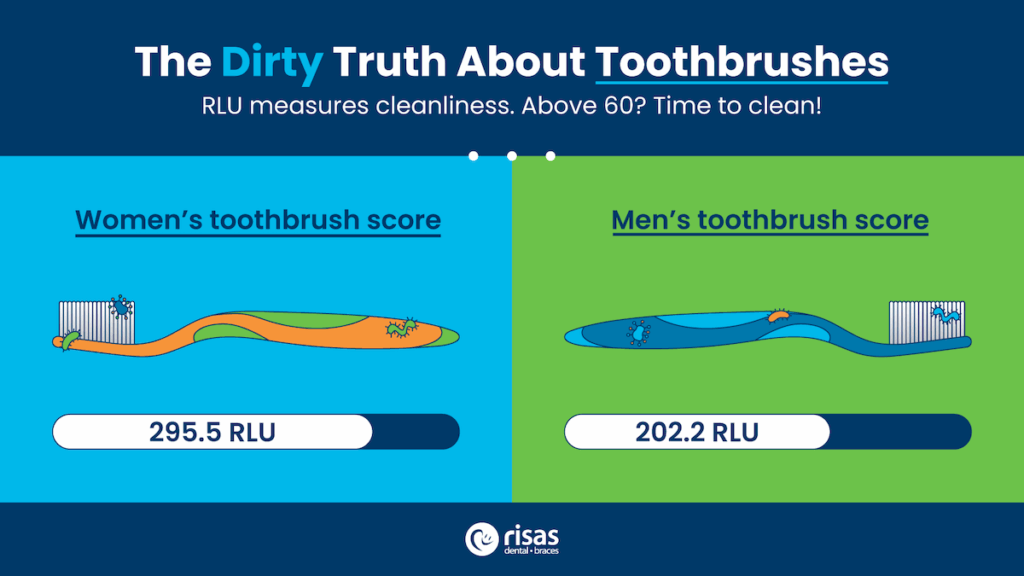
How clean are Americans’ toothbrushes?
Our research has uncovered some eye-opening results about the cleanliness of American toothbrushes.
The average RLU level for a toothbrush owned by a female participant sits at 295.5 RLU, while the acceptable range for cleanliness is between just 20-60. We did find variation however, with one toothbrush having a relatively low level of 80, while another showed a level of 3,837 RLU. Other brushes fell in the 134, 161, and 558 RLU range.
But what about our male participants? Well, the average RLU level was slightly lower (coming in at 202.2), yet we also found some significantly high figures. On two of the toothbrushes we swabbed, we found elevated RLU levels of 3,248 and 4,635.
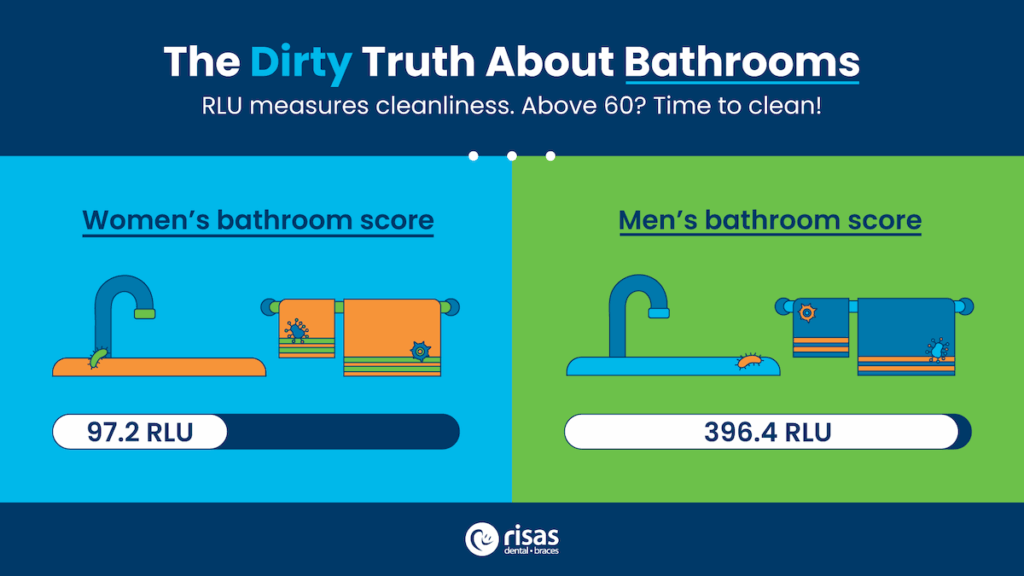
Bathroom cleanliness levels
Next, let’s take a look at the cleanliness levels in our participants’ bathrooms. The average female bathroom RLU score sits at 97.2, while we found a higher average score of 396.4 when swabbing male bathrooms.
Swabbing specific areas like door handles, sinks, and taps also revealed some interesting differences.
Female bathroom door handles are significantly cleaner (98 RLU compared to 457). Similarly, female participants’ bathroom sinks were also noticeably cleaner, with the right side of their sinks showing RLU levels of just 24, while male sinks showed an average of 668.
While the tap area in our male bathrooms had a slightly lower RLU of 252, female bathroom taps still came in cleaner (120 RLU).
Toothbrush cleanliness: What do the experts have to say?
To gain some professional insight, we asked Dr. Singh, from Winit Clinic, to shed some light on our findings:
“I've seen alarming data with high RLU levels associated with toothbrushes and sink basins. ATP bioluminescence testing provides an excellent measure of organic contamination, and with values as high as 4,635, it is likely that there is extensive presence of micro-organisms such as bacteria and biofilm. With the range for acceptability pegged between 20 and 60 RLU, toothbrushes and their environments are clearly well outside the cleanliness thresholds. This means that, unknowingly, people might be exposing themselves to bacteria every time they brush.”
“One of the most significant risks associated with using a contaminated toothbrush is that it could lead to oral infections. Once the pathogens settle on the bristles, they get introduced into the oral cavity, where they can cause gum disease, contribute to cavities, and even lead to systemic infections in those with low immunity. Long-term use of a contaminated toothbrush could be devastating to the oral microbiome, as it predisposes the mouth to colonization by more pathogenic bacteria, which then results in chronic inflammation of the gums and possibly other mouth-related complications.”
“Cross-contamination is another issue. Having toothbrushes stored in proximity in an unhygienic atmosphere creates the right environment for the bacteria to migrate from one brush to the other. High bacterial loads in shared bathroom spaces can promote the spread of illness-causing germs such as those associated with some gastrointestinal- and airway-tract infections. Since almost all of the places have high ATP, these areas definitely serve as important niches for bacterial growth. This reinforces the need to disinfect toothbrushes frequently, store them upright in a dry place, and replace them every three months or earlier if the bristles become worn or dirty.”
How to maintain optimal toothbrush hygiene
The good news is, with a bit of guidance, keeping your brush clean is relatively easy. Dr David Ryan, DMD at Risas Dental shares some top tips below:
- Storage matters: “Most people store their toothbrushes in a holder on their sink, however this can expose them to high levels of bacteria. Storing your brush in an upright position, as far away from the toilet as possible, can help reduce bacterial exposure. Also avoid using toothbrush caps, as they can trap in moisture promoting bacterial growth.”
- Rinsing isn’t enough: “While rinsing your brush after each use is helpful, you’ll need to give it a deeper clean every once in a while, too. Soak it in antibacterial mouthwash or a 3% hydrogen peroxide solution for 3-5 minutes. Afterwards, rinse thoroughly with warm water.”
- When to replace it: “It’s important to replace your toothbrush every 3-4 months (or sooner if the bristles start to fray). A well-worn brush is a breeding ground for bacteria, and it won’t clean your teeth effectively.”
While a clean toothbrush is crucial for your oral health, Dr Ryan also explains how important it is to choose the right type of brush and incorporate additional steps into your routine:
- Choose the right tools: "Not all toothbrushes are created equal, soft-bristled brushes are generally the safest and most effective for removing plaque without damaging your enamel or irritating your gums. Whether manual or electric, what matters most is your technique and consistency."
- Don't brush alone: "Your toothbrush is just one part of complete oral hygiene routine. Be sure to floss daily to remove food and plaque from between your teeth, where your brush can't reach. Adding an antibacterial mouthwash can also help reduce harmful bacteria and keep your breath fresh."
- Keep it personal: "Never share your toothbrush, even with family members, as this can spread germs and increase your risk of infections. Also, make sure each toothbrush in your household is clearly marked to avoid mix-ups."
When in doubt, ask your dentist: "If you're unsure whether you're using the right brush or following the best routine for your specific needs, your dentist can help you customize your oral care for maximum effectiveness."
Well, there we have it: our insights on how clean (or dirty) the average American toothbrush really is.
Brushing plays a key role in keeping our mouths healthy, but its effectiveness relies on proper care, storage, and regular cleaning. So, follow the above tips, and ensure you’re prioritizing brush cleanliness for a healthy smile.
And if you’re due for a check-up soon, find a location near you and book with Risas Dental today. From exams to cleanings and extractions, we offer a variety of affordable services and expert oral health guidance.
Methodology
The tests were conducted using an ATP bioluminescence test, which measures the amount of adenosine triphosphate - a molecule found in and around living cells - on a particular surface, indicating the level of cleanliness.
Swabs were taken using Hygiena’s UltraSnap Surface ATP Test and EnSURE Touch monitoring system to determine RLU results.
America's Smile Report
Americans are famous for their dazzling smiles, with straight, white teeth often seen as a cultural hallmark. From Hollywood stars with their red-carpet-ready grins to everyday Americans who prioritize a shining set, a confident smile is attributed to health, happiness, and even success.
But are all Americans proud of their smiles? And are some states more focused on achieving a gleaming grin than others? We’ve conducted a survey of 2000 US consumers to find out! Asking about everything from hygiene habits to annual dentist visits, we’ve collected data to uncover the truth about American teeth. Intrigued? Dive into a full rundown of the survey results below!
The truth about America's teeth: dental habits, costs, and cosmetic trends
Maintaining a healthy smile involves more than just brushing - regular visits to the dentist and a thorough oral hygiene routine are essential too. But how good really are Americans at taking care of their teeth? Here’s what we discovered:
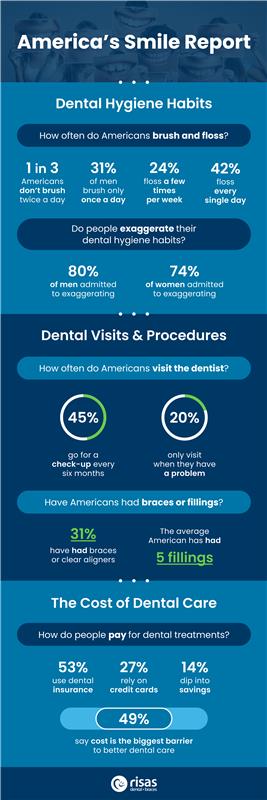
Dental hygiene habits
Our survey revealed that 63% of Americans brush their teeth twice a day or more, with 37% brushing less regularly. Interestingly, 31% of men are also only brushing once a day.
Flossing habits show a similar trend, with 42% of Americans flossing daily, and 24% flossing less regularly. We also found that women are 13% more likely to floss than men, with 19% of those in the 55-64 age bracket not flossing at all.
However, it’s clear that people aren’t always honest about their dental hygiene habits, in fact, 77% of participants believe patients tend to exaggerate about their at-home routine. We found that 82% of younger participants fib to some degree, and men (80%) are more likely to exaggerate than women (74%).
Visits to the dentist and dental procedures
As well as home hygiene, we also asked about trips to the dentist and professional care. We found that 45% of our participants go for a check-up every six months, while 20% only visit when a problem arises.
And what about procedures like fillings and crowns? Well, the average American has five fillings, 88% have at least one, and 98% of those 65+ have multiple. 31% have also had braces or clear aligners fitted in the pursuit of a perfectly straight smile.
The cost of dental care
Paying for dental treatments can be a struggle for many, with 53% of our participants relying on insurance, 27% using credit cards, and 14% dipping into their savings. Almost half agreed that the cost of treatment is a significant barrier (with younger Americans being far less likely to have insurance than older generations).
Overall, 63% of Americans are missing teeth, have crowns, and implants, and 80% of those aged 55+ have some degree of tooth loss. It’s a different story for younger participants however, with 67% of 18-24-year-olds still having all their natural teeth.
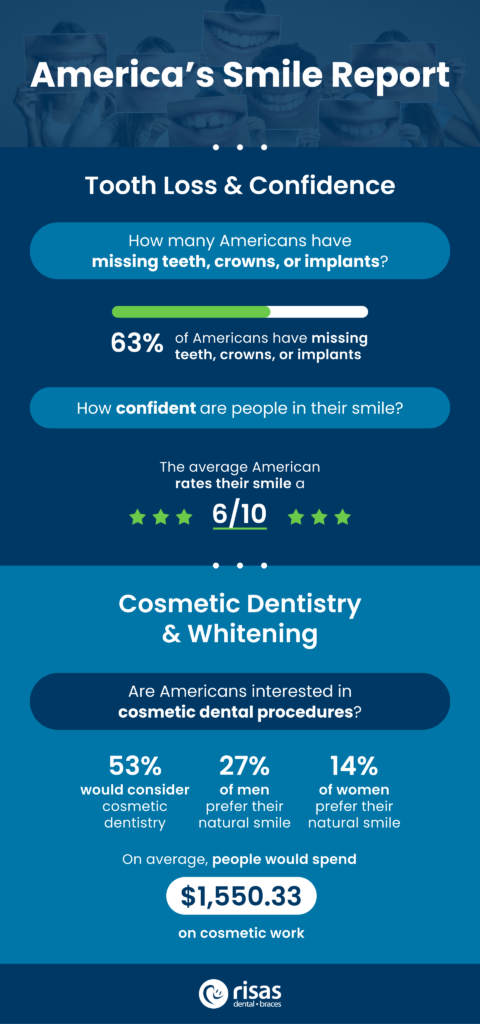
Cosmetic dentistry and whitening trends
On average, Americans are rating their smiles six out of ten, and amongst male participants, this rises to a seven. 30% of Americans are happy with their natural teeth, with more men (33%) than women (25%) having confidence in their smile.
Having said this, 53% would consider cosmetic dentistry (such as veneers or bonding) if they had the funds. We found that they’d gladly spend upwards of $1,550.33 to improve the appearance of their smile!
While 71% have never had any professional whitening, 28% use at-home whitening strips or toothpaste to keep their teeth nice and bright. When it comes to gender and age, women are 32% more likely to use strips than men, and 82% of those aged 55+ have never had their teeth whitened.
How do the results vary by location?
We don’t all have naturally flawless teeth or the means to achieve a Hollywood smile, but are some states happier with their teeth than others? Dive into our regional insights below:
Phoenix, Arizona
66% of Arizona residents brush their teeth twice a day, with 51% also regularly flossing (two essential habits to implement if you want a shining smile). Having said this, 75% of people are convinced that dental hygiene routines are exaggerated.
When it comes to visiting the dentist in Phoenix, we discovered that 39% go for a checkup at least every six months, yet 24% are less thorough, only visiting when a problem arises. The averageArizona resident has five fillings, with 89% having at least one. And when it comes to paying for procedures, 53% rely on dental insurance, with 12% dipping into savings.
In Arizona, 36% love their natural teeth, and 30% use whitening strips to achieve their desired smiles. Overall, the average resident rates their smile a strong seven out of ten, with 41% saying they would consider cosmetic work to improve it further.
Denver, Colorado
In places like Denver, residents also rate their smile satisfaction seven out of ten. 58% brush their teeth twice a day (sometimes even more), with 48% flossing daily too.
When it comes to fillings, the average resident has four, with 85% having at least one. 48% of people have also had braces or clear aligners with the hopes of straightening out their smiles.
Just over half of people go for regular check-ups, and most rely on insurance to cover the costs of inspections and treatment. On average, residents are willing to spend around $2,302.08 on cosmetic work at a Denver dentist, suggesting they place high importance on their smile’s appearance.
San Antonio, Texas
How do results vary amongst those in Texas? Well, 59% brush their teeth twice a day or more, with a further 41% flossing daily. 37% go to the dentist for a check-up every six months, yet a huge 77% of residents believe people exaggerate about their hygiene routine.
27% have had clear aligners or traditional braces, and 29% use whitening toothpaste or strips to achieve their desired smiles. 21% have had a crown or an implant, and the average resident has had five fillings.
People visiting a San Antonio dentist seem to be less willing to spend money on cosmetic work ($1,477.72), with 32% preferring their natural smiles.Overall, those in the state rate their smile six out of ten, coming in slightly less than Arizona and Colorado.
Las Vegas, Nevada
Those in Nevada rate their smiles seven out of ten on average. Although when quizzed about their dental hygiene habits, we found that 50% of Nevada residents don’t brush twice a day. On top of this, a whopping 88% believe that people exaggerate their hygiene habits at the dentist.
The average resident has six fillings, with 27% having crowns or implants too. 46% have also had braces or clear aligners, with the same amount going for a check-up every six months. But what about teeth whitening trends in the area? Well, instead of visiting a Las Vegas dentist for professional whitening, 19% rely on at-home methods to achieve a pearly smile.
So, while many Americans are attentive to their dental hygiene, others aren’t brushing or flossing as regularly as necessary to maintain a healthy smile. The cost of dental care also remains a barrier for many, especially amongst younger patients…
“While many clearly prioritize a stellar smile, our survey found that 1/3 of Americans aren’t brushing twice a day, and 13% are failing to floss altogether. Yet if you want a healthy, gleaming smile, these are two oral hygiene habits you’ll need to implement. Regular check-ups and honesty at appointments are also crucial, allowing you to nip problems in the bud before they progress into anything painful or costly.”
Eager to achieve a Hollywood smile at home? Here are some additional expert tips on how to care for your teeth. Dr. Collin Bowerman, Chief Dental Officer at Risas reveals simple at-home hacks to help your smile.
1. Consistency is key to help your maintain your smile. Brushing and flossing regularly is the secret to a confident smile. If you only do it occasionally, you won’t get the full benefits. Making oral hygiene a daily habit means you’re more likely to feel good about showing off your teeth.
2. Make it part of your morning and evening routine! Keep your toothbrush and floss next to something you always use—like your skincare products or coffee maker—as a reminder to stay consistent.
3. Upgrade your routine for a cleaner feel. Using an electric toothbrush, a good toothpaste, and mouthwash can take your oral care to the next level. Brushing for two minutes, followed by mouthwash (used as directed on the bottle), leaves your mouth feeling ultra-fresh.
Well, there we have it: our insights on the states with the best smiles as well as how to keep yours in tip-top condition. From brushing and flossing to scheduling regular appointments, there are a variety of things you can do to ensure you have a smile you’re proud of.
Risas Dental offers a variety of affordable dental services such as exams, cleanings, fillings, extractions, braces and more. For more information on available treatments locally, visit https://risasdental.com/locations/
Methodology
US survey of 2,000 consumers conducted by 3Gem.
In the past, braces were fairly simple. They were usually made up of plain silver metals, and patients didn't have much say in how they looked. Nowadays, getting braces is a fun and creative experience. The brackets that make up braces have elastic ligatures, or rubber bands, that come in all sorts of colors. Patients can choose anything they want from light, eye-catching colors to dark, discreet shades.
With so many options, deciding on a single color can be difficult. Ultimately, you want something that suits your unique personality while also making your teeth shine brighter. Let's take a closer look at the available colors and how to pick the right color for you.
What Color Braces Are Available?
When it comes to braces colors, the sky’s the limit. You'll find everything from white and clear elastic bands to striking black and brown bands. In between these two extremes are all the colors of the rainbow, from purple and blue to red and yellow. You can settle on a single color or combine a few — most patients choose between one and two colors.
Many orthodontists offer a color wheel to help patients imagine their braces. This tool shows all of the available colors and helps patients to see the differences between hues. If you're interested in blue braces, for example, the color wheel can help you pinpoint the exact shade of blue you're looking for.
How Often Can I Change My Braces Color?
If you're worried about picking the right braces color, you may be relieved to learn that it's just a temporary decision. Your orthodontist can change out the rubber bands during your adjustment appointment, which generally occurs every 8 to 12 weeks. If you find a color you really like, you can also ask for the same one each time.
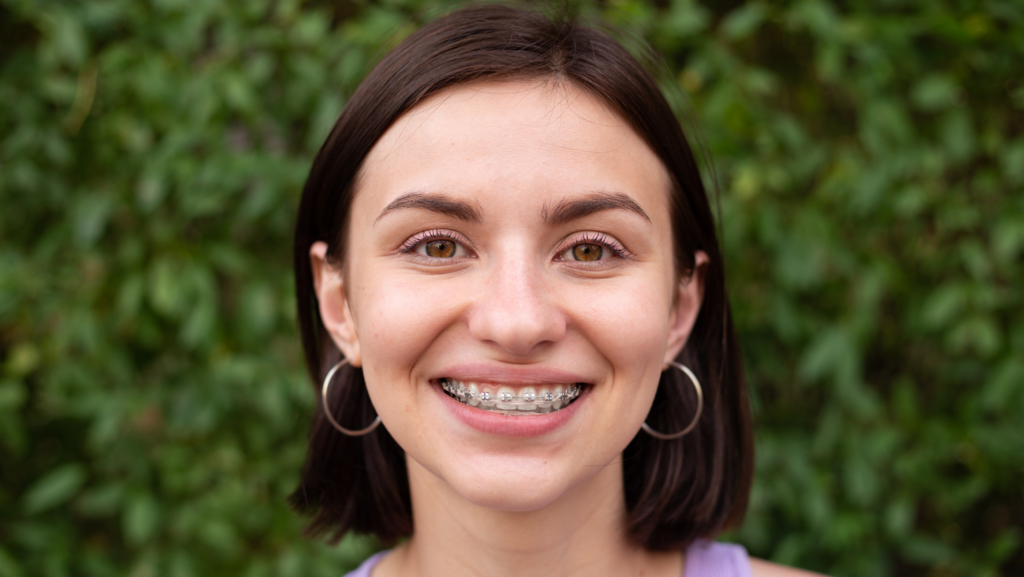
What Braces Color Is Right For Me?
There's no single answer to the question, "What color braces should I get?" Instead, the answer depends entirely on what you're looking for. Here are a few factors you could base your decision on.
1) Personal Preferences
The most straightforward way to choose a color is by simply selecting what you like. This could be your favorite color, a popular color combination, or something meaningful to you such as your school or alma mater colors. You should also consider the type of look you're trying to achieve. If you're going for an upbeat look, for example, stick with light, cheerful colors like pink, orange, or red. If you want a more laid-back vibe, cool colors like dark blue, lavender, and silver work well.
2) Seasonal Events/Themes
If you can't settle on a single color, consider changing things up based on the time of year. Are you trying to be festive this holiday season? Go for Christmas colors and get red and green rubber bands. Do you want to flaunt your spooky side for Halloween? Black and orange bands are the way to go. In addition to picking seasonal colors, you could adjust based on events in your life. If you have a sports game coming up, for example, you could pick bands that match your team's colors.
3) Physical Appearance
A great way to figure out the best color for you is by using your appearance. Start by picking a physical feature, then think about which colors go well with that feature. Here are a few starting points to base your braces color on:
- Skin tone. Darker skin tones tend to go well with bright jewel tones, like emerald green, ruby red, and violet. Lighter skin tones match cooler colors like light blue and green.
- Eye color. If you have brown eyes, earthy colors such as blue and green are a great choice. For lighter eyes, you'll want bright colors that can make them pop. Lilac, light blue, and pink tend to go well with lighter eye colors.
- Hair color. As with skin tones, dark hair goes well with bolder jewel tones. In contrast, light blonde hair suits cooler colors.
A helpful way to identify a complementary color is by using a braces color wheel. Start by choosing a certain physical feature, then locate its color on the wheel. Once you've found it, go to the matching color on the opposite side of the wheel. Whatever this color is, it should accentuate your chosen feature. If your dentist does not have a traditional color wheel, you can find one online.
How Bands Can Make Your Smile Look Whiter
Along with considering your general physical appearance, it's important to think about the appearance of your teeth. A common question that many patients ask is: what color braces make my teeth look whiter? If you're interested in whiter teeth, a dark color is the way to go. Darker colors, such as navy blue, dark purple, and black, provide a nice contrast to the natural whiteness of your teeth. This will make your teeth seem even brighter than they are.
What Braces Colors Make Your Teeth Look Yellow?
While some colors can help your teeth seem whiter, others can actually make your teeth look yellow. For example, clear and white braces can become discolored over time, causing a yellow appearance. Yellow and gold braces can look like stains or discoloration, so you probably want to avoid those colors.
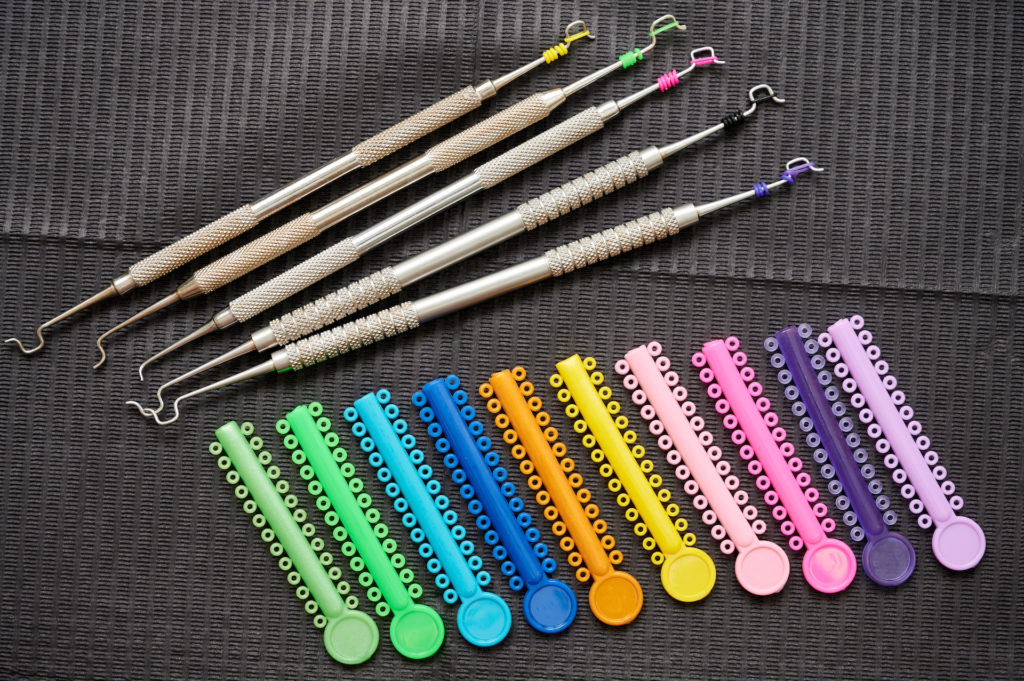
What to Keep In Mind When Picking the Colors of Braces
Here are a few general tips to keep in mind when trying to find the best braces color:
- Avoid natural-looking colors. Try to avoid natural-looking bands that resemble food. Colors like brown and dark green can make it seem like you have meat or spinach stuck in your teeth.
- Follow good oral health habits. While going for a dark color can help your teeth appear more white, the best way to maintain a bright smile is through proper oral hygiene. Regular brushing and flossing will help prevent unwanted tooth discoloration.
- Get creative. Colored braces are a great way to show off your creativity. Don't be afraid to experiment with different colors and try something new during your next appointment!
Along with picking a good color, it's important to work with a reputable team. At Risas Dental, we always put patients first. Whether you're trying to make your teeth seem whiter or need advice on a color combination for your child, you can count on us for expert advice.
Frequently Asked Questions
The most popular colors for braces vary depending on age and gender. Adults tend to go for more discreet options, like white and clear braces. On the other hand, children often pick colorful braces. Some prefer pink or light blue, while others choose darker colors like deep red and navy blue.
If you want to maintain a professional look, try to avoid braces colors that are too bright (such as hot pink or light purple). Many working adults opt for neutral colors, like silver or white. Dark tones also provide a professional look and have the added bonus of making your teeth look whiter.
While braces are usually the recommended option for children, adults may use an alternative, such as clear aligners. Unlike braces that use metal/porcelain, wires, and rubber bands, aligners are made of plastic. Customized to fit your mouth, they gently move teeth over time. As long as your teeth are not too crooked, aligners are generally a viable option. But because they don't use elastics, you can't change the color — they're always clear.
Answering the question "what color braces should I get?" is no easy feat. If you still need guidance, our teammates are happy to help! We'll walk you through your options, answer any questions, and recommend a color that best suits your needs. Our dedicated bilingual team, affordable plans, and patient-first mentality helps us stand out from the crowd.
While it's common knowledge that eating sugary foods can increase your risk of tooth decay, did you know that cavities are actually contagious? As strange as it may sound, the bacteria that cause cavities can be transmitted through saliva when people share food, drinks, and even kisses!
Our teammates at Risas Dental understand that this information can be a bit mind-blowing, but it's also pretty interesting. We've put together this informative guide that details the ins and outs of cavity transmission, along with some important preventative steps to take to boost your dental hygiene routine.
The Science of Cavity Transmission
The science of cavity transmission is actually quite simple — your saliva can transmit cavity-causing bacteria to other people. People carry over 700 types of bacteria in their mouths that they can transmit to others through normal activities. Just like you can spread a cold or flu virus through saliva droplets when you cough, sneeze, or share eating utensils, you can do the same with cavities.
Bacterial Causes of Cavities
Believe it or not, all cavities are caused by bacteria. In fact, some dental professionals even refer to cavities as bacterial infections of the teeth. The human mouth contains many types of bacteria, but research has shown that Streptococcus mutans is the most common culprit for cavities. These bacteria live in dental plaque and can increase the risk of cavity development when it multiplies.
How Do Bacteria in the Mouth Contribute to Tooth Decay?
Consuming sugary foods can increase the risk of cavities because the bacteria in the mouth that break down sugars can create plaque acids. When the acids dissolve on the teeth, they can contribute to tooth decay. Smoking dries out the tissues in the mouth by reducing saliva production, which can put people at a higher risk for developing cavities.
Which Types of Bacteria Are Most Commonly Associated With Cavities?
The most common type of bacteria associated with cavities is Streptococcus mutans. This type of bacteria thrives when the foods you eat create a low pH balance in the saliva. It secretes acid, which sticks to the teeth and can cause mineral loss and cavities.
How Do Bacteria Spread From Person to Person?
Bacteria are spread from person to person in several ways. If a person touches a contaminated surface and has bacteria on their hands, they can spread bacteria to others through touch. Sneezing and coughing can transmit saliva droplets to others through the air, and close contact such as kissing can transfer bacteria from one person to another.
Transmission Modes of Cavities
Saliva is the single transmission mode of cavities. Kissing, sharing food and beverages, and eating from the same utensils can spread the bacteria that cause cavities. Saliva that sprays from the mouth when coughing or sneezing can also transmit cavity bacteria.
Can Cavities Be Spread Through Saliva?
Cavities can be spread through saliva in a few ways. When a person has Streptococcus mutans bacteria in their saliva and kisses someone on the mouth, their saliva can transmit the bacteria to whomever they kiss. If someone takes a bite out of a hamburger or other hand-held food and another person takes a bite from the same food, cavity-causing bacteria can be transferred through saliva on the food. Sharing eating utensils and straws can also cause cavity bacteria in saliva to spread.
What Are the Risks of Sharing Toothbrushes and Other Oral Hygiene Tools?
Most dental professionals warn against sharing toothbrushes and other oral hygiene tools. In addition to potentially spreading the bacteria that causes cavities through saliva, these tools can also transmit blood and contagious viruses.
How Can Parents Pass Cavities to Their Children?
Parents can pass cavities to their children through activities that transmit saliva. Kissing your little one on the mouth, sharing food, and even popping their pacifier in your mouth can create a risk of transmitting cavity-causing bacteria.
Risk Factors for Cavity Transmission
The main risk factor for cavity transmission is shared saliva. Mothers can transmit cavity bacteria in their saliva to their children by pre-chewing their infant's food, using the same toothbrush, and even cooling their food by blowing on it. Adults with active cavities can transmit bacteria through close contact.
Lifestyle and Environmental Factors
Lifestyle factors that may contribute to cavity development include poor oral hygiene, sugary diets, acidic carbohydrates, and inadequate fluoride intake. Not only can fluoride help to prevent cavities, but it can also reverse them in some cases.
A lack of fluoride in drinking water is the most common environmental factor linked to the risk of cavities. Fluoride strengthens tooth enamel and makes teeth less prone to cavity development. Children who drink water with little to no fluoride may form weaker enamel, which can affect the teeth's natural ability to re-mineralize.
How Do Lifestyle Choices, Such As Diet and Smoking, Affect Cavity Transmission?
The bacteria that cause cavities can be transmitted through smoking if a person with cavity-causing bacteria in their saliva shares a cigarette. The same goes for sharing food. If someone with cavity-causing bacteria in their saliva takes a bite of food and hands you their fork or spoon, you could "catch" a cavity.
What Environmental Factors, Such As Water Quality and Air Pollution, Impact Tooth Decay Rates?
Some studies have shown that areas where pollution is high have high cavity rates among children. Highly polluted areas may also increase the levels of toxic compounds in children's teeth. Scientific studies also suggest that drinking water containing perfluoroalkyl and polyfluoroalkyl substances (PFAs) can contribute to cavity development. PFAs are chemicals that were once used to make nonstick cookware and other products.
Cavity Treatments at Risas Dental
If you think you might have a cavity or you're concerned about tooth decay in your teen or little one, our teammates at Risas Dental are happy to help. We "speak patient" to ensure clear communication and complete understanding of our dental services, and we treat adults, teens, and children. Schedule an appointment today.
Frequently Asked Questions (FAQs)
Are cavities really contagious?
Some research has shown that mothers can pass cavities onto their children through activities such as blowing on food and sharing eating utensils. This is due to the potential exchange of saliva that contains cavity-causing bacteria.
Can you get cavities from kissing?
Kissing can sometimes lead to the transfer of cavity-causing bacteria. Since kissing sometimes involves an exchange of saliva, a person with cavity-causing bacteria in their saliva can unknowingly transfer bacteria to the person they kiss. Once inside the other person's mouth, the bacteria can colonize and lead to cavities.
Is it safe to share toothbrushes with family members?
Most dental professionals recommend against sharing toothbrushes with family members for a few reasons. Brushing your teeth can sometimes cause bleeding gums, especially in people with gum disease. Blood on the toothbrush can transfer into the next user's mouth. Also, viruses and bacteria can easily be transferred from person to person via shared toothbrushes.
How do you know if you have cavities?
In its early stages, a cavity might go unnoticed and not cause any physical symptoms. However, you may notice brown or black specks on the teeth that look like stains, and your teeth may have visible holes or "pits" in the enamel. As cavities progress, symptoms can include pain when biting down and tooth sensitivity.
What happens if cavities go untreated?
If cavities go untreated, it can lead to further decay that makes its way into the tooth pulp. This can increase the risk of infection and inflammation, and the tooth may require root canal treatment.
A recent study by DentaVox showed a strong connection between your oral health and your love life. In this study, respondents with excellent oral health reported being the most pleased with their love lives. On the other hand, less than 40% of people with poor oral health reported being satisfied in their intimate relationships.
But this isn't the only study to show these results. Another study showed that 71% of women and 58% of men reported that a great smile was really important when picking a romantic partner. The bottom line? Your oral health can have a significant effect on your love life.
The Link Between Oral Health and Romantic Relationships
Knowing that a link between oral health and romantic relationships exists is one thing. But why is there a link? There are actually a few reasons that your oral health can affect your romantic relationships from bad breath to gum disease and beyond.
Bad Breath and Its Impact on Relationships
Having bad breath can affect your self-confidence, making it more challenging to be intimate with someone. It can also cause an intimate partner to be less attracted to you because they'll want to avoid things like kissing. Thankfully, there's an easy fix for bad breath.
Bad breath is primarily caused by the same bacteria responsible for tooth decay and gum disease. Maintaining good oral hygiene is the best way to prevent bad breath. Good oral hygiene habits are discussed more in-depth below.
Another cause of bad breath can be the foods you eat. For example, garlic is known to have a strong smell that affects your breath temporarily. If this is an issue, brush your teeth and use mouthwash to rinse away most (or all) of the strong smell.

Gum Disease and Its Effect on Intimacy
Gum disease can be a mood killer, and not just because it can lead to bad breath. Gum disease can actually cause erectile dysfunction in men. This is because gum disease is associated with chronic inflammation, which can cause damage to certain cells in your body. These cells also happen to line the blood vessels in men's sexual organs. When these cells become damaged, it can result in impaired blood flow that affects your ability to get or maintain an erection.
Plus, did you know cavities are contagious? During kissing and other intimate activities, it's possible to spread the bacteria that cause tooth decay to your partner.
Tips for Maintaining Good Oral Hygiene and a Happy Love Life
The good news is that there are ways you can improve or maintain good oral hygiene. You'll be significantly more confident and have a much happier love life as a result.
Daily Oral Hygiene Practices
To improve or maintain good oral hygiene, you should be sure to:
• Brush your teeth at least twice a day for at least 2 full minutes.
• Floss at least once daily.
• Use a mouthwash at least once daily.
• Get regular dental check-ups (at least once a year).
• Avoid sugary foods and drinks.
• Avoid smoking and alcohol.
• Eat a balanced, healthy diet.
• Drink plenty of water.
Cosmetic and Restorative Dental Procedures
You may also find it helpful to look into cosmetic and restorative dental procedures. These procedures can improve your smile and make you feel more confident. For example, braces can be used to straighten crooked or misaligned teeth. Professional whitening treatments can brighten smiles that are stained from coffee, smoking, or wine.
Conclusion
Maintaining good oral health is important for a happy love life. It prevents the spreading of bacteria to intimate partners and a great smile can make you feel more confident. If you're ready to talk to a dentist about more ways you can improve your oral health, schedule an appointment today.
Frequently Asked Questions (FAQs)
Can oral health problems really affect your love life?
Yes, oral health problems can really affect your love life. For example, bad oral health can lead to erectile dysfunction, bad breath, and reduced confidence.
Is bad breath a deal-breaker in relationships?
For many people, yes. Thankfully, there are many ways you can deal with bad breath so it doesn't cause problems. To combat bad breath, keeping good daily oral hygiene practices is most important.
How can I tell if my partner has good oral hygiene?
If you've been in a relationship for a long time, you can tell your partner has good oral hygiene if they regularly brush and floss their teeth. A partner likely has good oral hygiene if their breath smells good and they have a bright white smile. Unfortunately, sometimes it's challenging to tell if your partner has good or bad oral hygiene.
What can I do if my partner has bad oral hygiene?
The best thing you can do is gently bring up the topic and educate your partner on good oral hygiene habits. Sometimes, bad oral hygiene is caused by a lack of knowledge.
Can kissing spread oral health problems?
Yes. Kissing can spread bacteria responsible for cavities and gum disease.